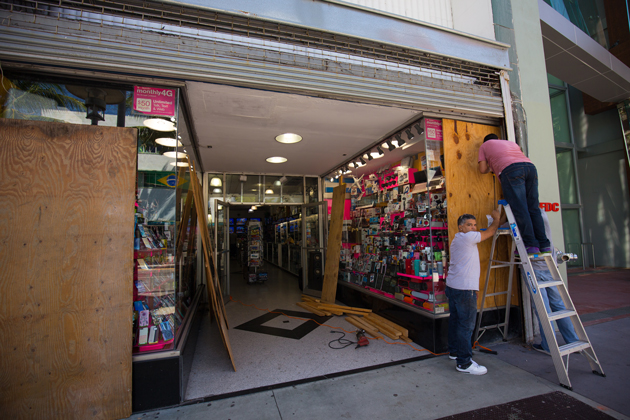The first Atlantic hurricane of the season is rapidly approaching the mainland United States, with experts currently expecting Hurricane Dorian to make landfall in Florida on Sunday. For businesses both in the storm’s path and beyond, it is important to take the opportunity to consider how to protect property from hurricane damage before and after storms. The Congressional Budget Office estimates that, on average, hurricane damage costs $54 billion annually, and even at this late date, there is always more businesses can do to try to mitigate such losses and damage to their property and operations.
One of the simplest steps is having an accurate replacement cost and business income valuation. If valuations were conducted previously, consider how long it has been and any significant changes, such as assets or location. It is also important to document the property before a storm arrives, including taking photos and videos, or even using 3D-mapping technology to record a detailed account of an entire space, building or structure. Most importantly, confirm with the insurer that the policy is current and that the terms, conditions, and limits are all well understood.
Creating and practicing a detailed disaster plan is another important step. Business owners can use risk modeling programs, which run a range of potential scenarios digitally to flag issues and create a more holistic plan. If digital modeling is unavailable, walking through or rehearsing plans can help identify potential issues. For example, built-in hurricane shutters are great, but if they are not tested ahead of time and then malfunction in the hours before a storm, it may be too late to find an adequate solution. When tailoring the disaster response plan, also consider the available coverage to limit out-of-pocket expenses after a storm. Coordinating with your insurance professional is the best way to minimize uninsured expenses.
One critical factor for any business disaster plan is how to protect data, including business data as well as plans and building layouts. House these valuable documents in a secure location in case of physical damage to the main data storage unit or computer drives. Insurance companies will likely request very specific information to process any claim, so speak with an insurance company adjuster in advance to determine what types of documents they need for filing a claim, then store those in an easily accessible online portal.
Create a business continuity plan that addresses how to expedite recovery or avoid interruption, potentially including employing an off-site workforce, creating an alternative workspace, and locating backup suppliers.
It should also always include a communication plan so that key players remain connected. Business owners should engage with critical vendors and emergency responders in advance to assist with loss mitigation, temporary repairs, and restoration. Following a wide-spread catastrophe, these vendors are in high demand and having a preexisting relationship will help.
Once the storm passes, the first step must be communication: contact everyone to address safety concerns and identify their needs. Phone lines and internet service are often unreliable following a storm, and business owners should be prepared to use multiple forms of communication, from texts to emails and applications that use Wi-Fi.
After reestablishing contact, quickly document the damage (ideally in both photos and videos) since demonstrating the extent and cause of loss becomes increasingly difficult over time. Policyholders should notify their broker and insurance company of the loss immediately, and once damage is documented, policyholders must reasonably and with due diligence preserve and protect property and commence restoration while mitigating future risk. For example, if a structure suffers roof damage, but no action is taken to “reasonably and quickly” provide temporary cover, rain damage following the storm may not be covered as part of the storm’s damage.
Finally, it is critical to log all logistical and monetary details.
After a hurricane, there may be challenges accessing damaged areas, so retain all notices, civil orders or police mandates concerning any access limitations to later provide the insurance company. An insurance company cannot expect a policyholder to put a tarp on a roof if access was prohibited. Likewise, policyholders should track all expenditures. After a disaster, the price of restoration services can increase dramatically, so acquire and keep multiple estimates of any cleanup, construction, or emergency service needed. Having these estimates will allow policyholders to assert the cost was both reasonable and necessary and receive reimbursement.
Hurricane season is already here but it is not too late to take preparative steps to help protect your business from the often unpredictable effects of storms. The only things business owners can control are the steps to help prevent and recover from damages.

